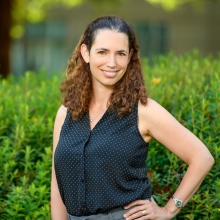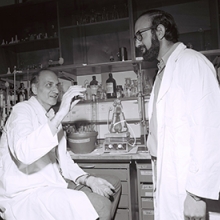Catching catalysts in action
New scientists

Catalysts drive a vast array of chemical reactions from nature and the human body to modern manufacturing. Only in the last few years have scientists had access to powerful enough tools to begin to probe exactly what happens in a catalytic reaction. Dr. Baran Eren has dedicated his research to finding ways to observe catalysts in the act of speeding up chemical reactions at the level of the interactions of atoms and molecules.
Dr. Eren’s scientific journey has taken him from his native Turkey to Basel and Zurich, Switzerland; to Berkeley, California; and now to Rehovot. To spy on the details of catalysts in action, Dr. Eren has worked with specialized microscopy and spectroscopy equipment and has experimented with new techniques to observe the changes in the molecules and reaction surfaces involved in chemical reactions. His investigations have already revealed new insights into the reactivity of the copper-based catalysts used in a variety of catalytic conversion reactions including carbon dioxide reduction, and oxidation reactions for methanol and carbon monoxide.
Dr. Eren, who joined the Department of Chemical and Biological Physics, plans to study a handful of catalytic reactions that are important for energy research. These include the synthesis of methanol by recycling carbon dioxide emissions, the oxidation of methanol, and the action of a family of copper-based catalysts used in a variety of environmentally friendly “green” chemistry reactions. These are critical reactions for future clean energy solutions. For instance, these kinds of catalysts can help turn carbon dioxide into clean-burning methanol for biofuels.
Dr. Eren has creative ideas for new ways to couple spectroscopy with microscopy in order to reveal new levels of information about what happens at the surface of catalysts under actual reaction conditions. His skills and expertise will contribute to the Weizmann Institute’s strengths as an innovator in catalysis, spectroscopy and microscopy, and sustainable energy research.
Taking advantage of the freedom to try new things offered by the Weizmann Institute, he plans to adapt new technologies to be able to view exactly what happens during catalysis and how it works on the molecular level. The new generation of tools he plans to build can be used to study catalytic energy conversion processes. They will also help enhance studies and innovative developments in environmental chemistry, new generation sensors, electrochemistry, and photochemistry.
Dr. Baran Eren was born in Turkey and received his BSc in mechanical engineering at Boğaziçi University in Istanbul in 2007, and his MSc in micro-nano systems at ETH in Zurich, Switzerland, in 2009. He completed his PhD summa cum laude in experimental condensed matter physics at the University of Basel, Switzerland, in 2013. From 2014 until joining the Weizmann Institute in September 2017, he worked as a postdoctoral fellow at the Materials Sciences Division of the Lawrence Berkeley National Laboratory in California. Dr. Eren is a member of the German Physical Society, the American Chemical Society, the American Vacuum Society, and a former member of the Swiss Physical Society (2010–2013). He was awarded a Swiss National Research Foundation Postdoctoral Mobility fellowship for 2014 and 2015. He is also a U.S. National Master in chess, and a former member of the Turkish national team.








